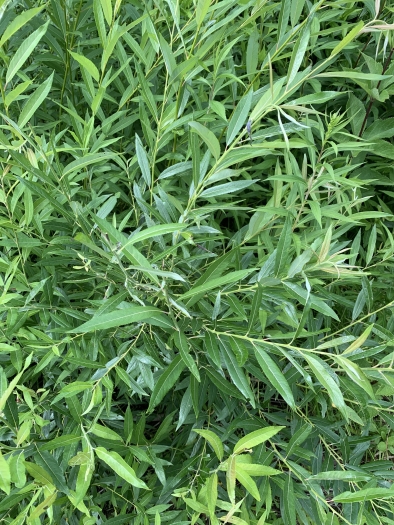Silky Willow
(Salix sericea)
Silky Willow (Salix sericea)
/
/

© Charlie Hohn
CC BY 4.0
Image By:
© Charlie Hohn
Recorded By:
Copyright:
CC BY 4.0
Copyright Notice:
Photo by: © Charlie Hohn | License Type: CC BY 4.0 | License URL: http://creativecommons.org/licenses/by/4.0/ | Uploader: charlie | Publisher: iNaturalist |





















Estimated Native Range
Summary
Salix sericea, commonly known as Silky Willow, is a deciduous shrub native to wetland habitats such as swamps, marshes, and along the banks of rivers and streams in the eastern United States and Canada. It typically grows to a height of 7-13 feet with an open, spreading form. The twigs are slender, flexible, and often purplish, while the leaves are lanceolate, serrulate, and exhibit a dark green, lightly hairy upper surface with a distinctive light green underside covered in white silky hairs. Silky Willow is dioecious, with male and female flowers on separate plants. The flowers are arranged in catkins that appear before the leaves in early spring, with the male catkins being more conspicuous. The plant blooms in May, and by June, it produces small capsules that release cottony seeds.
Silky Willow is valued for its ability to stabilize soil in riparian zones and its use in wetland restoration projects. Its fine-textured foliage and attractive winter twig color make it suitable for naturalistic plantings and wildlife gardens. It thrives in full sun to part shade and prefers consistently moist to wet soils. While it is not drought-tolerant, it can adapt to a range of soil types as long as adequate moisture is provided. Silky Willow can spread by suckering, which should be considered when planting near managed landscapes. It is relatively free of serious pests and diseases but can be susceptible to willow beetle infestations.CC BY-SA 4.0
Silky Willow is valued for its ability to stabilize soil in riparian zones and its use in wetland restoration projects. Its fine-textured foliage and attractive winter twig color make it suitable for naturalistic plantings and wildlife gardens. It thrives in full sun to part shade and prefers consistently moist to wet soils. While it is not drought-tolerant, it can adapt to a range of soil types as long as adequate moisture is provided. Silky Willow can spread by suckering, which should be considered when planting near managed landscapes. It is relatively free of serious pests and diseases but can be susceptible to willow beetle infestations.CC BY-SA 4.0
Plant Description
- Plant Type: Shrub, Tree
- Height: 6-12 feet
- Width: 6-12 feet
- Growth Rate: Rapid
- Flower Color: N/A
- Flowering Season: Spring
- Leaf Retention: Deciduous
Growth Requirements
- Sun: Full Sun, Part Shade
- Water: High
- Drainage: Fast, Medium, Slow
Common Uses
Erosion Control, Low Maintenance, Water Garden
Natural Habitat
Native to wetland habitats such as swamps, marshes, and along riverbanks
Other Names
Common Names: Shining Willow , Red Willow
Scientific Names: Salix sericea , Salix coactilis , Salix cordata f. coactilis , Salix grisea , Salix grisea , Salix pensylvanica , Salix pensylvanica , Salix petiolaris var. grisea , Salix petiolaris var. sericea , Salix sericea f. glabra , Usionis grisea
GBIF Accepted Name: